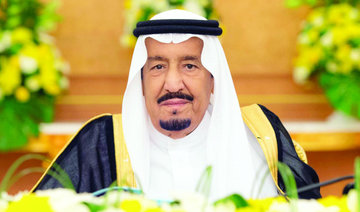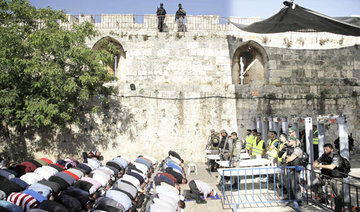RIYADH: The Shoura Council has condemned Israeli authorities for the closure of Al-Aqsa Mosque, saying it sets a serious precedent and violates the rights of Muslims.
In a statement issued during its 47th ordinary session on Tuesday, the Shoura Council expressed grave concern over the extreme escalation and absurd measures which, it said, aim to strangle the already precarious conditions of the Palestinian people and continue Israeli aggression.
The Council stressed the need for Arab and Islamic governments and parliaments to work with the international community and peace-loving countries to put an end to Israel’s provocative practices.
During the same session, the Shoura Council approved a number of amendments on income tax related to foreign companies operating in the Kingdom in the areas of oil and finance.
The Council’s decision, which came following deliberations on a report presented by the Financial Committee on the income tax system, said the amendments are in line with Saudi Arabia’s Vision for 2030, which aims to find alternative sources of income for the Kingdom, aside from oil revenue.
On another issue, the Shoura Council approved amendments to the system for protection against Acquired Immune Deficiency Syndrome (AIDS) and the rights and duties of those who are HIV-positive.
Council members also stressed the need to intensify media and cultural efforts to combat terrorism and to reflect the Kingdom’s efforts in this regard.
In their 46th ordinary session on Monday, the Shoura Council discussed a variety of topics.
The Council asked the Ministry of Health to provide facilities for the aged who may require long-term medical care, and to coordinate with all concerned parties to provide the required funds to apply a strategy of security and safety within its health facilities.
The Shoura called on the Ministry to intensify efforts to apply a national program for early tests of newborn babies in hospitals, and to improve performance indexes related to infant mortality rates and the mortality rate of mothers during childbirth.
The Council also stressed the need to coordinate with relevant bodies to secure the funds required for the operation of King Fahd Specialist Hospital in Tabuk.
On another issue, the Shoura Council requested that the Ministry of Energy and Industry work out a comprehensive plan for the promotion of local content in commodity and service procurement deals and for the localization of its companies’ workforce.
The Shoura also called on the Ministry to encourage and attract investment, and remove barriers to that investment, for small and medium enterprises (SMEs) in the area of mining, industry and gas, and to establish a unified window for the issuance and renewal of mining licenses.
The Shoura Council then called on King Fahd National Library (KFNL) to coordinate with other libraries, cultural centers and educational institutions in the Kingdom. It also urged KFNL to introduce services to assist people with special needs and to make all its facilities accessible to them.
Later, the Shoura members deliberated on the annual report of the General Authority for Meteorology and Environmental Protection following a report presented by the Committee of Water and Agriculture on the Authority’s performance.
Members of the Council lashed out at the Presidency of Meteorology and Environment (PME), saying it “neglected the environment” and instead focused on “predicting the weather for the next five days.”
Some members called for its abolition, or suggested merging it with the Saudi Wildlife Authority (SWA). They said the PME failed to offer scientific explanations for marine animal deaths, did not monitor the deterioration of sea coral, and did not play a role in dealing with increasing emissions and waste from factories.
“This entity gained popularity among young people who subscribe to its social media accounts in order to be notified about weather-emergency holidays,” said member Muaddi Al-Madhab.
Member Khalifa Al-Duwsari said the PME is almost dysfunctional. “It implements the instructions of municipalities without studying the issues. There are companies that are destroying marine life within Saudi Arabia’s regional waters.”
Other members said the entity has taken no stand whatsoever against practices that damage the environment.
Members demanded strict control over companies working in marine environments. Companies working on King Fahd Causeway, for example, cause large losses of fish resources and the PME “lacks the personality to protest,” one member said, calling for the hire of private companies to monitor and preserve the environment.
Members said it is a shortcoming not to have an online system through which the public can report environmental violations.
Saudi Shoura condemns Israeli violations in occupied Palestine
Saudi Shoura condemns Israeli violations in occupied Palestine

Meteorology center forecasts 3 rainy days in most parts of Saudi Arabia

- People in coastal areas cautioned against high waves
RIYADH: Rain of varying intensities will prevail in most parts of Saudi Arabia from January 10 to 12, the National Center for Meteorology (NCM) forecast on Thursday.
In a weather bulletin, the center warned of downpours accompanied by winds of up to 60 kilometers per hour, and the possibility of torrential rain and hail. High waves are to be expected along the coasts, the NCM said.
The forecast said the northern regions of Al-Jouf, the Northern Borders, and Hail will have rainy conditions on Friday and Saturday.
Rain is expected in Tabuk and Madinah regions on Friday, the Eastern Province, Asir, and Jazan will see rainfall from Saturday to Sunday, and in Qassim on Saturday.
As for Riyadh and Al-Baha regions, rain are to be expected from Friday to Sunday.
The NCM urged the public to stay updated about the weather conditions in the Kingdom by visiting the daily reports on its website, the "Anwaa" application, or its social media accounts.
Saudi Falcons Club CEO and Kazakhstan ambassador discuss ways to boost cooperation

RIYADH: The CEO of the Saudi Falcons Club, Ahmed Al-Hababi, met Kazakhstan’s ambassador to the Kingdom, Madiyar Menilbekov, in Riyadh on Thursday to discuss opportunities for cooperation and ways in which these might be enhanced to benefit mutual goals.
One of the topics was the Hadad Program, a leading initiative developed by the club with the aim of returning falcons to their natural habitats and saving the species from the threat of extinction.
Menilbekov praised the club for the important role it plays in enhancing falconry and preserving its cultural heritage.
The club said the meeting was part of its efforts to strengthen international partnerships in keeping with the goals of the Saudi Vision 2030 plan for national development and diversification.
Saudi envoy to US outlines efforts to maintain safety of Saudi citizens amid LA wildfires

LOS ANGELES: Saudi ambassador to the US, Princess Reema bint Bandar, reaffirmed on Thursday the embassy’s commitment to the safety and security of Saudi citizens in Los Angeles and surrounding areas impacted by wildfires, the Saudi Press Agency reported.
In a statement, Princess Reema emphasized that the embassy and the consulate general were working tirelessly to support citizens affected by the fires.
She highlighted that ensuring their well-being remains a top priority for Saudi diplomatic missions in the United States.
She said the team was monitoring the situation closely and was prepared to provide immediate assistance to those in need. The embassy and consulate were dedicated to ensuring the security and safety of all Saudi citizens in affected areas, she added.
The embassy and consulate have activated a round-the-clock response team to address concerns and offer necessary support, SPA added.
The wildfires in California have prompted widespread evacuations and caused significant disruptions in the Los Angeles area, with officials working to contain the blazes.
KAUST conducts research study on microbiomes in glacier-fed streams

- Collaboration with scientists from Swiss Federal Technology Institute of Lausanne
RIYADH: The King Abdullah University of Science and Technology, in collaboration with scientists from the Swiss Federal Technology Institute of Lausanne, has conducted an unprecedented, in-depth study on microbiomes — microorganisms that live symbiotically with humans or other organisms — in glacier-fed streams.
These streams, originating from glaciers atop the Earth’s highest mountains, harbor a wealth of unique microorganisms.
The research team collected and analyzed samples from 170 glacier-fed streams over five years across regions including New Zealand, the Himalayas, the Russian Caucasus, the Tien Shan and Pamir Mountains, the European Alps, the Scandinavian Alps, Greenland, Alaska, the Rwenzori Mountains in Uganda, and the Ecuadorian and Chilean Andes, the Saudi Press Agency reported.
The findings, published in the renowned scientific journal Nature, represent the first global reference for microbiomes in glacier-fed streams.
These streams, which are among the most extreme natural freshwater ecosystems in the world, are located at mountain summits and are characterized by near-freezing temperatures and low nutrient levels.
They also serve as the origin for many of the world’s largest rivers, functioning as vital water reservoirs for the planet.
KAUST researcher Dr. Ramona Marasco emphasized that glacier-fed streams were highly vulnerable to climate change.
She spoke of the importance of establishing a baseline for their microbiomes to better understand the rate of ecological change, while highlighting KAUST’s extensive genetic sequencing efforts, which have significantly contributed to creating a comprehensive picture of these endangered microbiomes.
The researchers successfully developed the first global atlas of microorganisms in glacier-fed streams.
Their work revealed that these streams harbor a unique microbiome distinct from other cryospheric systems, such as glaciers, frozen soils, and ice-covered lakes.
About half of the bacterial species in these streams are endemic to specific mountain ranges. The scientists attribute this phenomenon to the geographical isolation of mountain ranges, similar to islands, and to the powerful natural selection exerted by the harsh conditions in glacier-fed streams.
Saudi swimmer’s remarkable 30km swim from Alkhobar to Bahrain

- Mariam Binladen’s feat of endurance and grit completed in over 11 hours
JEDDAH: In a remarkable feat of endurance and determination, Saudi Arabia’s Dr. Mariam Binladen recently completed the Khalid bin Hamad Swimming Challenge, covering a distance of 30km from Alkhobar, Saudi Arabia, to Salman City, Bahrain.
Binladen achieved this incredible feat in 11 hours, 25 minutes and 47 seconds.
Among her achievements, the open-water swimmer became the first Arab woman to cross the Red Sea to Egypt in October 2022, and the first to traverse Dubai Creek with a swim of 24 km in 2017.
In addition, she was the first woman from the Gulf to swim across the English Channel, covering 33.5 km in August 2016.
Speaking to Arab News about her feat on Dec. 26, Binladen said: “This swim was on my radar for 7 years.

“Unfortunately it was difficult to find an optimum window to do the challenge, primarily because weather conditions in the Gulf of Bahrain are incredibly difficult to predict.
“I had to study the sea very well taking into account the tides, wind speed, wave patterns, swells, water temperature and marine life cycles in order to minimize risk and achieve this goal.”
She added: “Amongst the many challenges of this event was swimming at night in the dark, in fluctuating cold-to-warm water temperatures, with the added complexity of tidal changes.
“As a way of mitigating the hazardous conditions the swim started at the Water Tower at Alkhobar at 1:50 a.m. Visibility was zero so I was swimming blind coupled with water temperatures ranging from 17 to 22 degrees.
“Instead of feeding every 30 minutes I fed every 15 minutes to avoid hypothermia and to maintain my body heat until sunrise, which was half-way through the swim.
“The tide in this area shifts every six hours which meant swimming part of the way against the tide which requires a huge amount of stamina and mental agility in order not to become exhausted.”
She added: “Each challenge poses its own distinct difficulties and unique set of conditions; during the Red Sea swim it was how to maneuver around sharks and avoid their feeding times.
“The English Channel, for example, was freezing cold and it is a busy shipping lane so it was necessary to address those concerns and plan accordingly.
“The Bahrain swim was undoubtedly hazardous and posed many issues, the distance being one of them. Before any swim I undertake area studies, conditions, risks and train to mitigate risks and for the conditions that I will face. Of course there are always some surprises.”

She has faced other challenges during her career. “My most unusual swim was in an ice glacier in Switzerland, this challenge was to swim in (minus) 2 degrees for 85 meters.
“I undertook extensive physical and cognitive training in order to prepare for this unique challenge. The burn of the ice-cold water will remain with me forever.”
In addition to being an athlete and dentist, Binladen also helps refugees and creates awareness through her platform, which has been acknowledged by organizations worldwide.
In 2016, she opened the first free medical facility of its kind for dental treatment in a Syrian refugee camp in Azraq, Jordan.
“Of course it is rewarding to treat any patients, I love to help people in any capacity I can, whether through treatment, inspiring them in sport or supporting them to swim gives me enormous satisfaction.”
As the Kingdom empowers women, Binladen said that she is delighted to be living at a time when Saudi women can pursue their ambitions in the workplace, sports and business.
“My advice to Saudi women is to never give up on your dream, with hard work and dedication you can fulfill your goals.”
On her future, she said: “It’s a common question, everybody is interested to know what’s next. All I can say is that I have a few possibilities in the pipeline and am carrying out area studies at the moment.”
“My ambition is to lead a fulfilling life in which I am constantly learning, developing, growing and making a positive impact on those around me, through my career, relationships or personal endeavors.
“I strive to pursue excellence and leave a lasting legacy that inspires others.”























